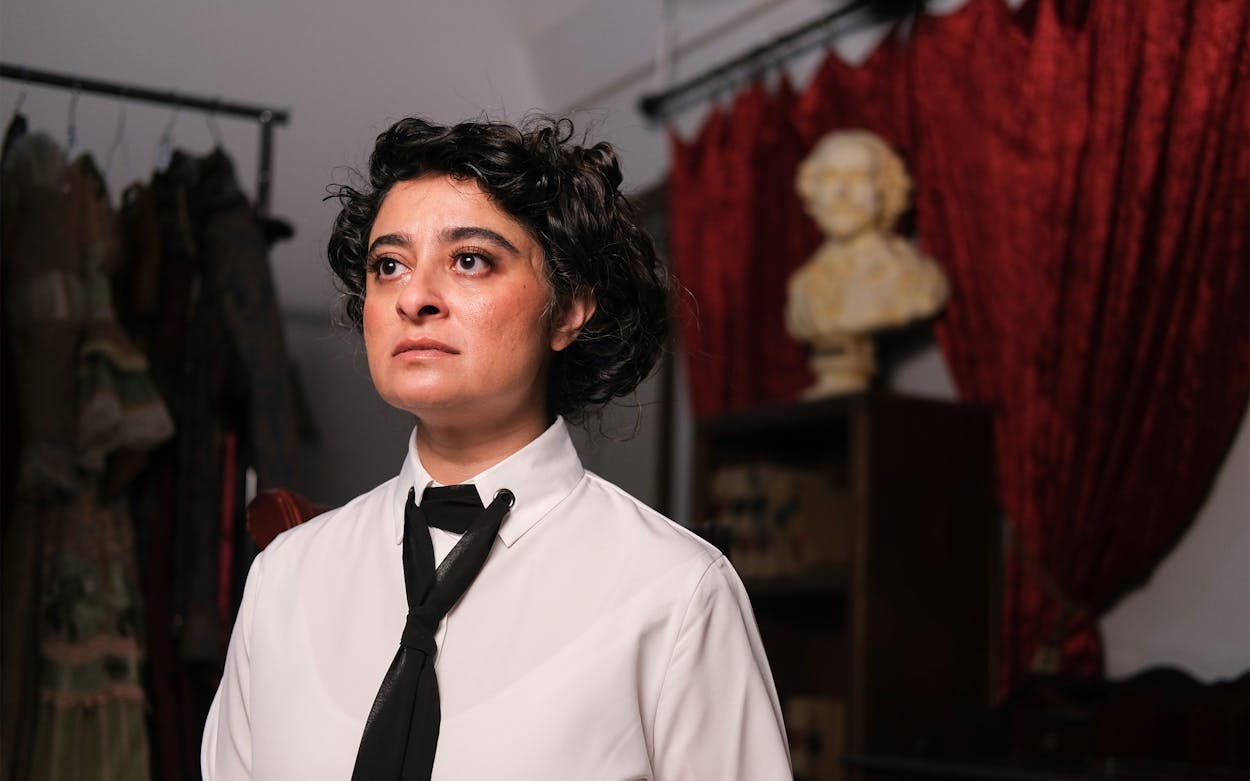“I love to play Katherine, from The Taming of the Shrew,” says Gloria Vivica Benavides, looking straight into the camera. “People say she’s feisty and opinionated. I want us all to be feisty and opinionated. I love it when women are pains in the ass.” A third of the way into Shakespeare Dallas’s new virtual production Shakespeare and the Suffragists, which commemorates the hundredth anniversary of the Nineteenth Amendment, Benavides is clad in full 1910s getup. She wears a ruffled white top with a long red skirt, and her hair is swirled into a loose Victorian bun—but in this scene, she’s breaking character and speaking as herself. “If you were to take me back four hundred years, I’d be angry too,” she continues. “I’m angry now with the roles that we’ve been assigned, as an American woman but doubly as a Latina, how pressured we feel to be feminine and beautiful, or else we have no value.”
The screen splits into four cells, and Benavides is joined by her three costars: Maryam Baig, Meagan Harris, and Stormi Demerson. Together they form a veritably Zoom-like Greek chorus of socially distanced suffragists. At the top left, Harris, sporting a short brunette bob and red lipstick, commiserates with the often-maligned heroine: “Kate’s a misfit in this world. She’s furious about either conforming to society’s standards or being labeled as a lunatic.” Demerson, from the lower left corner, chimes in: “She’s hard, but the world has made her hard, right? What does she have to lose?” Benavides, now at the bottom right, says, “So she tells him [Petruchio], ‘Go! Leave! Walk out that door!’ ”
The screen goes dark, then opens on a slightly cluttered dressing room with a wardrobe pushed into a corner. There’s a bust of Shakespeare atop a bookcase of antique tomes. Benavides strides in, grabs a boot off the shelf, and delivers a Katherine monologue—a fusion of a couple speeches from Acts III and IV—that concludes, “The door is open, sir. There lies your way. / You may be jogging whiles your boots are green. / For me, I’ll not be gone till I please myself. / I see a woman may be made a fool / If she had not a spirit to resist.”
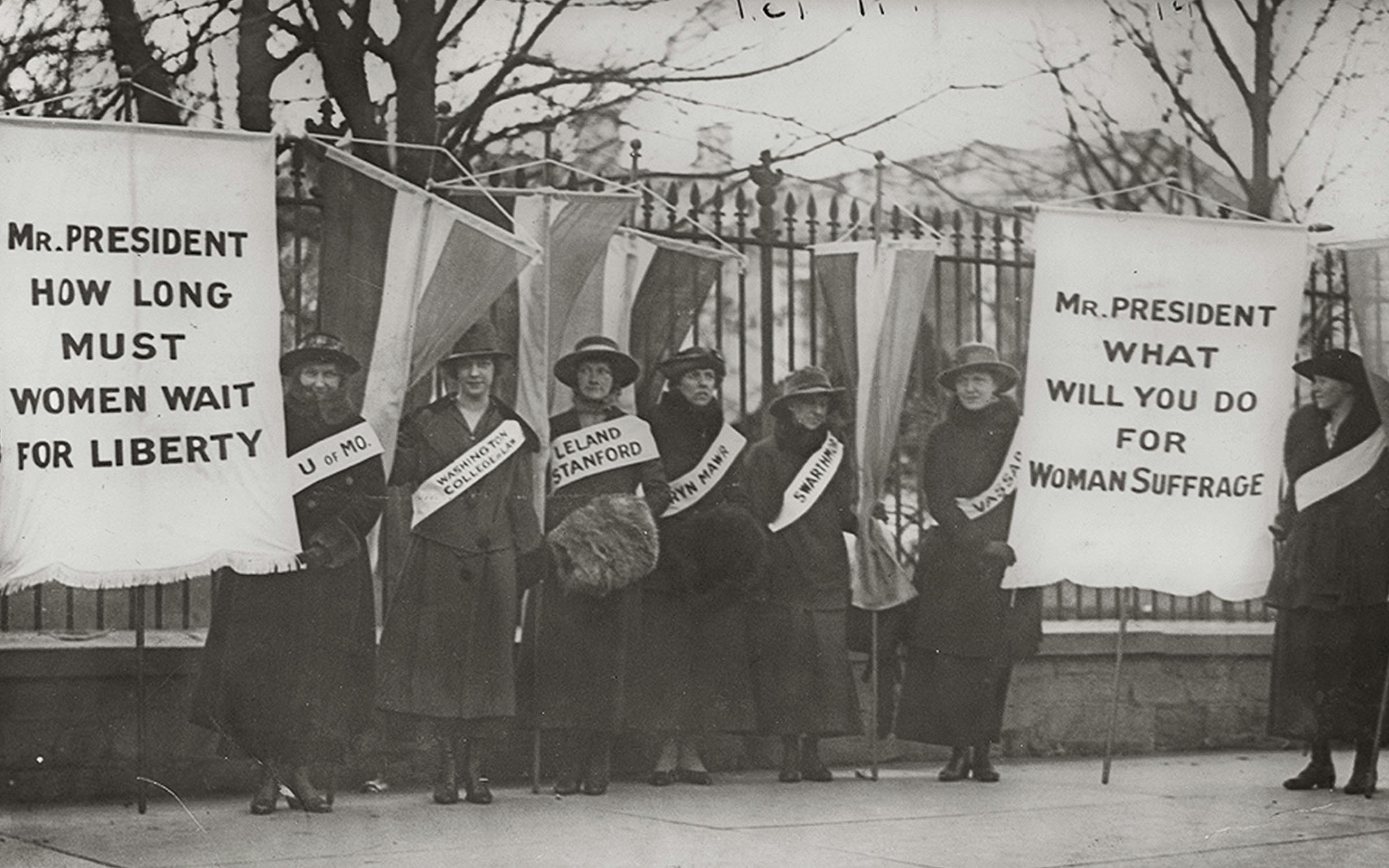
At just over thirty minutes, Shakespeare and the Suffragists, a new production coauthored by Shakespeare Dallas associate art director Jenni Stewart, covers a lot of ground: it’s part documentary, part performance, part textual analysis, part political call to arms. The play, which is streaming online through November 30, begins by exploring the history of the suffrage movement, focusing on how activists gathered inspiration from the works of Shakespeare—his most fiercely independent heroines in particular. As the four actors point out, six of Shakespeare’s women lead armies, eight disguise themselves as men to subvert their societies’ gendered expectations, and ten refuse to marry the suitors their fathers have selected for them, instead finding love on their own terms. Early suffragists also used the Bard more literally: the plays provided an excuse for activists to safely meet and perform.
Throughout, Shakespeare and the Suffragists nods to feminism’s slow, often inequitable gains. The 1870 passage of the Fifteenth Amendment granted Black men the right to vote, but many white suffragists failed to see the legislation as an incremental step forward and effectively sidelined suffragists of color in their quest to secure the vote, creating a racial divide that persists in the movement today. (Full enfranchisement wouldn’t occur until much later, with the Voting Rights Act of 1965 and its subsequent expansions.)
“I think that we’re getting to a place now where we’re having those conversations and talking about history a little bit more accurately,” Stewart says over Zoom. “Even progressive movements like women’s suffrage, they’d completely eliminate people of color who were really important in the movement and also hide the fact that some of these really progressive white suffragists were . . . totally racist.”
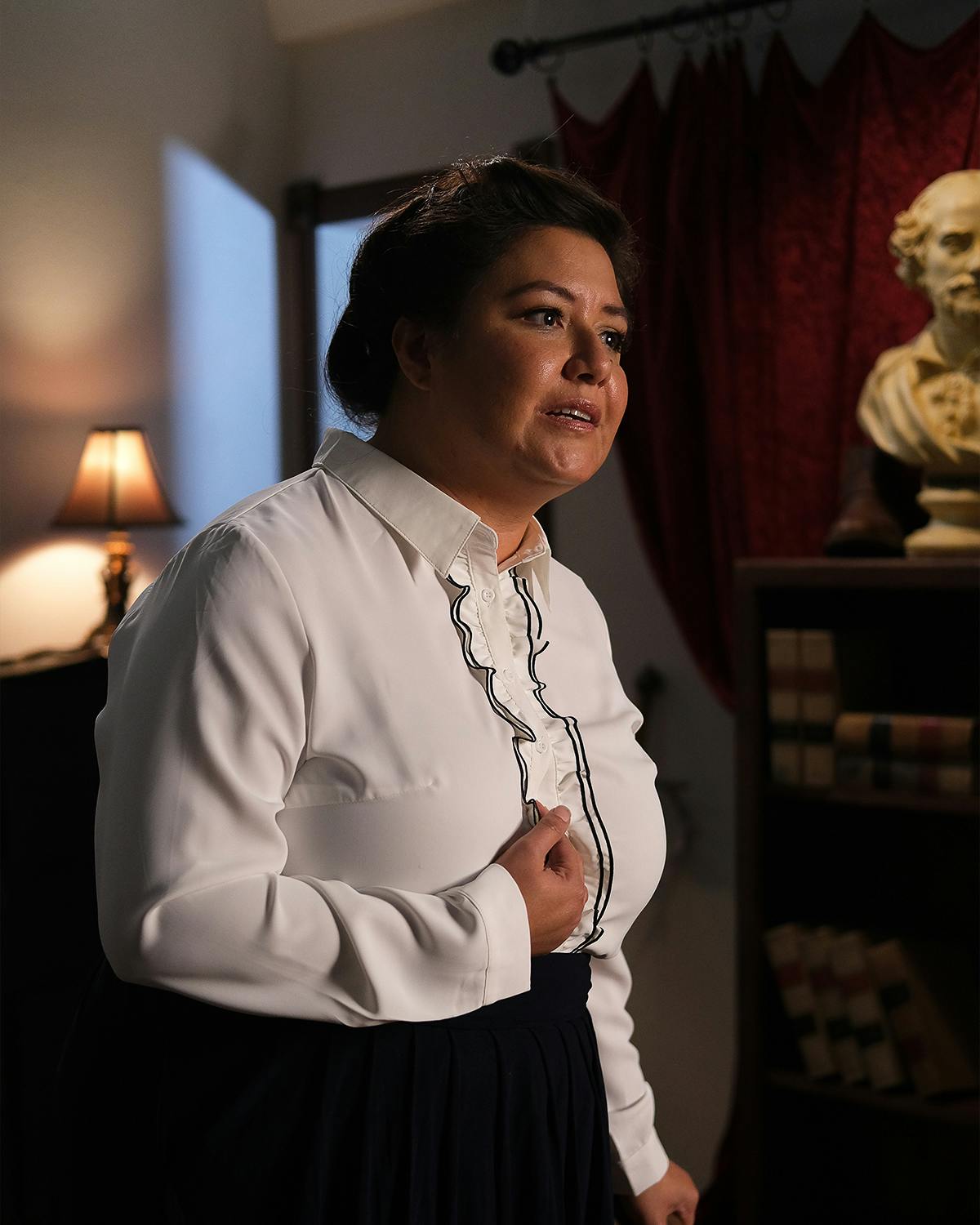
The Nineteenth Amendment should be commemorated, but it’s a bittersweet landmark. As the production’s suffragist chorus puts it, “Enfranchisement revealed women to be heroes . . . it revealed them to be selfish, and it revealed them to be the complicated humans that men have always been.”
But the show’s most effective moments are its most personal. They feature each of the four actors discussing the relevance of their Shakespearean monologue to their own lives. Meagan Harris talks about the emotional release of chopping off her hair after a lifetime of internalizing that women must perform a specific type of femininity: makeup, high heels, long hair. Would it render her, as an actor, less castable? As a person in the world, less datable? But she found it freeing—“I feel more like myself with my hair this way”—and she delivers as Joan of Arc from Henry VI, Part 1, a woman who was so dedicated to her cause that she died for it. (Fittingly, Joan of Arc would later serve as the inspiration for the twenties-era bob haircut.)
For Maryam Baig, who is originally from Pakistan, playing the cross-dressing Rosalind from As You Like It offers a chance to experience non-feminine freedom. “Rosalind was always expected to behave in a certain way, but now she can spit when she wants to, fart when she needs to, and it won’t be weird, you know?” She delivers her monologue in a shiny mustache, manspreading and clutching herself, a Shakespearean bro. Finally, Stormi Demerson, who performs a monologue as Paulina in The Winter’s Tale, discusses how she learned to be more assertive. “I’ve been paying more attention to how I manage the spaces I’m in,” she says. “Especially, as a Black woman, how I find ways to have my presence felt and be unapologetically myself in every space I’m in.”
These reflections feel immediate and genuine because they are. Stewart, coauthor Julia Dyer, and assistant director Whitney Holotik wanted to provide more interaction between the actors, none of whom were physically together for the production process (all rehearsals were held over Zoom, and the crew shot each performer’s footage separately). Holotik suggested that the actors discuss how they related to their assigned monologue, and Stewart and Dyer worked those details into the script, preserving each woman’s speech patterns to give the lines an organic, spontaneous feel.
The show closes with the cast imploring viewers to vote—along with a brief clip of Vice President–elect Kamala Harris, the first woman of color on a major party ticket—but with nary a mention of either guy who happened to be running for president. There’s some pleasing symmetry in the fact that, a hundred years after the Nineteenth Amendment was ratified, amid another pandemic, a play produced almost entirely by women that documents suffragists’ relationship with Shakespeare was staged just weeks before one of the most monumental elections in history.
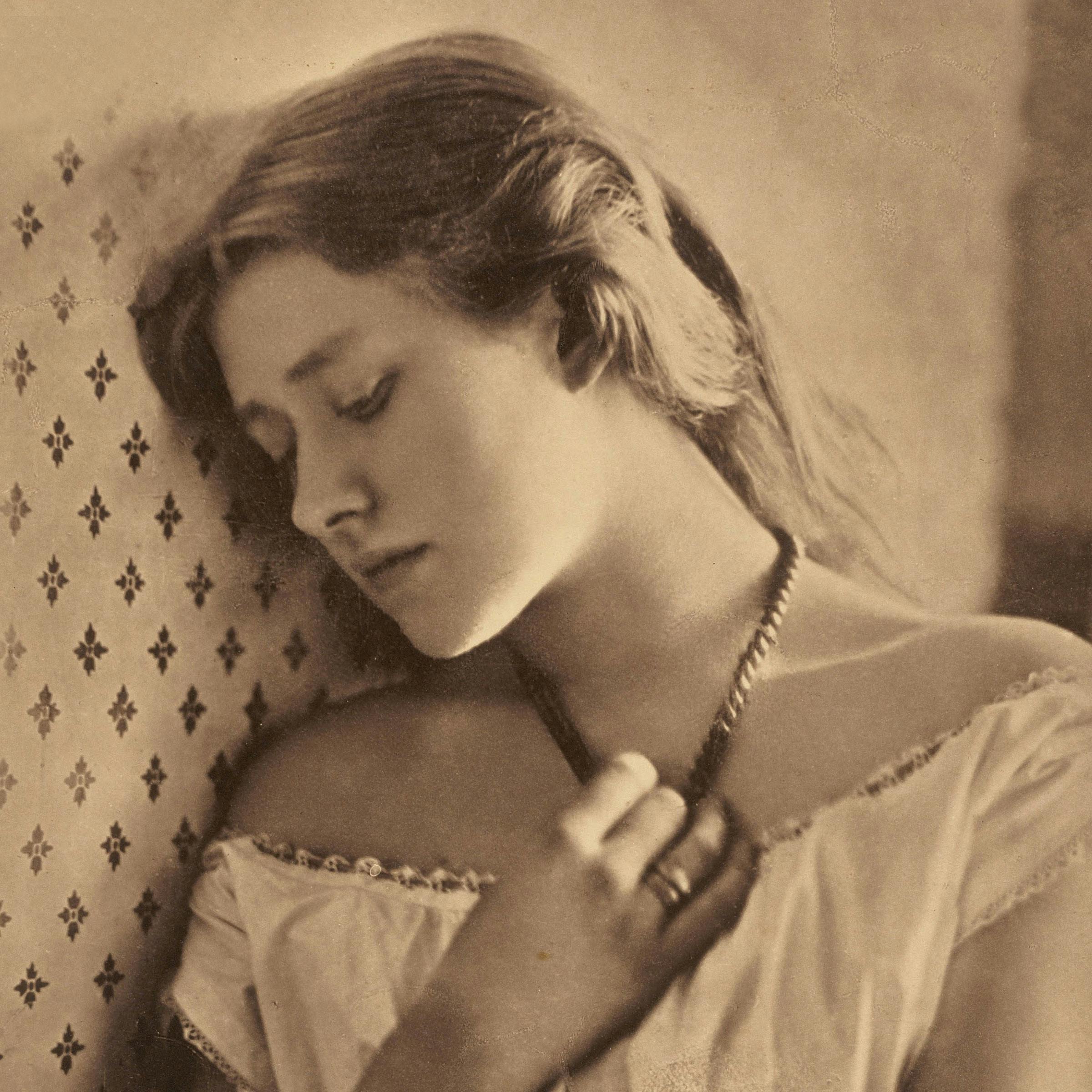
Jenni Stewart first got the idea for Shakespeare and the Suffragists back in 2018, when she was doing research for a production of The Taming of the Shrew. In her role as associate artistic director, Stewart selects plays each season, directs productions, and oversees the organization’s auxiliary programs. The Waco native is also the first woman in the company’s history to have held an artistic leadership role. Stewart was hoping to set her version in the 1910s, imagining the main character, Katherina, as a suffragist. She came across scholarship about how suffragists in the United States, the United Kingdom, and Canada, many of them Shakespearean actors, used the works of the Bard to justify their right to vote. Many of the activists staged all-female productions of Shakespeare and gathered to read plays, drawing from some of Shakespeare’s most spirited heroines: Rosalind, Isabella, Katherina, Beatrice. One Victorian actor, Ellen Terry, wrote a series of essays about the modernism of Shakespearean women and even toured England to deliver lectures on the subject.
“I kind of weirdly stumbled into this world of this relationship that I had never even considered before, both as a feminist and as a person who spends their entire professional life working on Shakespeare,” Stewart says. “So I was like, ‘Clock that. That would be a great program to do someday.’ ”
She didn’t have to wait long: the Nineteenth Amendment, which guaranteed white women in the United States the right to vote, celebrated its centennial this August. To mark the occasion, numerous organizations offered grants to groups who put on Nineteenth Amendment–focused performances. Stewart secured funding from several sources, including the Communities Foundation of Texas, the Embrey Family Foundation, and Dallas’s Office of Arts and Culture, to produce the show.
Stewart initially conceived of the presentation as a ninety-minute lecture-based play: she’d talk to audiences about the role Shakespeare played in the suffragist movement, and actors would deliver the monologues of appropriately plucky women across Shakespeare’s oeuvre. But then the pandemic hit, and Shakespeare Dallas canceled its summer plays (Merchant of Venice and Much Ado About Nothing). Then it canceled Romeo and Juliet, its fall play, which it was in the process of casting and creating the set for.
When I talked to Stewart in mid-September, she told me the company had just made the decision to scrap its winter stage production for financial reasons; it had been slated to run in January at Moody Performance Hall, in downtown Dallas, to a 25 percent capacity pandemic audience. Stewart hopes Shakespeare Dallas will return to live performances in 2021—Romeo and Juliet has been pushed to next fall. Annual memberships are down 50 percent, and ticket sales have been lower than expected, but the organization hasn’t laid off or furloughed its full-time workers, she says. “We run a lean, mean, mighty machine.” Shakespeare Dallas quickly transitioned to virtual offerings, which in addition to plays include lectures, book clubs, and the kids’ educational program Will on the Web. The organization has also hosted socially distanced outdoor movie screenings at the Samuell-Grand Amphitheatre.
For Stewart, changing the delivery method of Shakespeare and the Suffragists necessitated rethinking the length and format of the play. Watching a ninety-minute production in a dark theater is one thing, but it’s an entirely different experience viewing it at home. Shakespeare might’ve written King Lear in quarantine, but he didn’t have to shoot the footage and deliver it to internet audiences used to ubiquitous streaming content.
“That would be incredibly boring, one voice talking the whole time. So we were like, ‘Okay, let’s break this whole thing apart and completely throw it in the trash can and reimagine it,’ ” Stewart says. She partnered with North Texas screenwriter Julia Dyer and added four actors, amping up the interaction between the performers to mimic the feel of a live show. They also condensed the play to a swift thirty minutes.
Logistically, the act of shooting film has been a different experience for Stewart and much of the Shakespeare Dallas staff: although they hired a camera crew for this project, they helped edit the footage and directed the shoot, all while masked up, social distancing, and filming one actor at a time. “We joke that we’re not Shakespeare Dallas anymore—we’re Shakespeare Films,” Stewart says.
But along with the challenges, there was opportunity: the chance to perform to a larger, more varied audience than just those who would’ve seen the live performance in Dallas. So Stewart aimed to make the subject matter accessible to a wide-ranging viewership, from sixth graders to older adults. Having the actors speak to the camera also meant that they could use a teleprompter, allowing lines to be cut or reworked well into production.
In mid-September, eight drafts into the script and gearing up for shooting, Stewart was optimistic about having developed new skills, if a bit leery of how the pandemic would continue to unfold. (Same.) “As an artist, you’re always looking for the next challenge,” she says. “So there are aspects to it that are really engaging, but there are aspects to it that are also really terrifying. . . . There’s been a real sense of community and a spirit of ‘We’re all going to get out of this together.’ ”
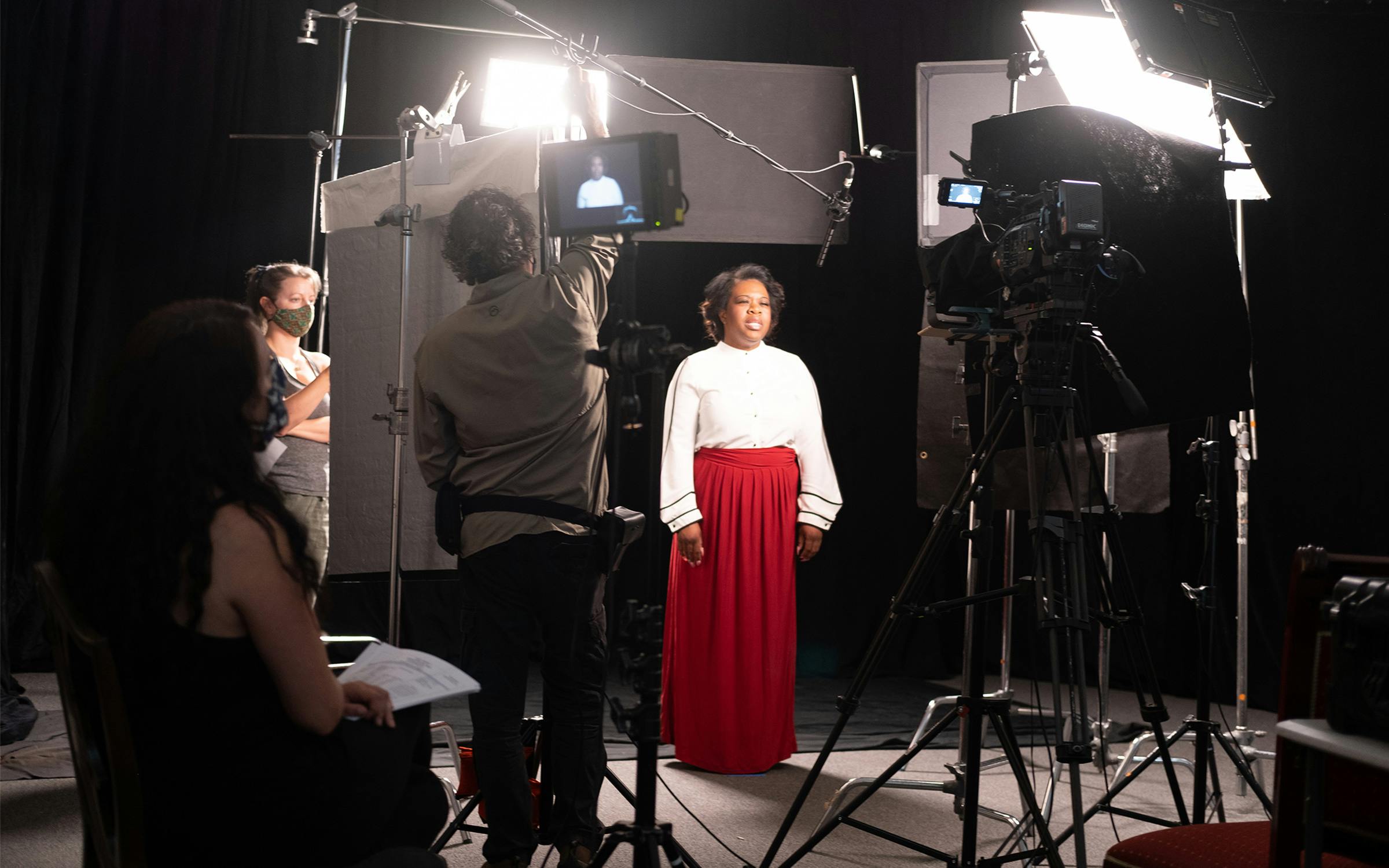
In the year 2020, at a time of racial reckoning, it’s reasonable to wonder why it’s still worth talking about Shakespeare, an author who’s enjoyed centuries of global fame precisely because of colonization.
Suffragists weren’t the first to look to Shakespeare to bolster their cause. For as long as the plays have been performed, activists have co-opted his work to make social statements. As Ann Christensen, the chair of the English department at the University of Houston, puts it, “Performances have a life of their own; they sometimes can be runaway trains and can inspire or incite people, including women, about what’s possible.” It’s never a “one-way street” when it comes to marginalized people engaging with even colonialist texts, she says.
In the early nineteenth century, decades before the end of slavery, the African Company in New York City staged an all-Black production of Richard III. And in apartheid South Africa during the eighties, the decision to cast a Black Othello was seen as controversial in a society that had forbidden interracial relationships for decades. In The Tempest, the character Caliban, who is enslaved, is described as a monster; Christensen notes that the role has historically been interpreted as any number of second-tier U.S. citizens, including an enslaved African in chains and a Native American. Occasionally, more subversive productions have portrayed Caliban as speaking better English than the other characters.
So maybe the question isn’t whether it’s possible to decolonize Shakespeare but rather how each generation has grappled with his texts and seen something of itself in them. Shakespeare and the Suffragists points out that before activists embraced the Bard’s independent, outspoken female characters, Victorians idealized his virtuous, “well-behaved” heroines who exemplified “passivity and suffering”—think Hermione from The Winter’s Tale and Ophelia in Hamlet. Christensen recalls teaching the drama Measure for Measure a few years ago, right as the #MeToo movement was starting to gain prominence, and noticing that her students found the work especially relevant. (A major plot point is a male official’s fixation on taking an unwilling woman’s virginity.) “After #MeToo, there was absolutely no way to see the play any other way than ‘This is an abuse of power,’ ” she says.
Similarly, applying a contemporary lens to the original intent of an author writing four hundred years ago guarantees few satisfactory answers. Was Shakespeare a feminist? Jenni Stewart says, well, probably not: the term didn’t exist back then. But at a time when Queen Elizabeth was capably ruling the country and men in power were doing “mental gymnastics” to diminish women’s accomplishments, the playwright portrayed women with fairness, she says. “I think he gave his characters depth and humanity that no other writer was achieving at the time.”
Stewart acknowledges, though, that the Bard set limits to the freedom he granted his female characters. “Shakespeare gives women a lot of opportunities to romp and play with those positions they wouldn’t normally have, but they always end up married at the end or dead,” she says. “It’s like, ‘That’s our only option?’ ” Shakespeare tends to “apologize” for giving his women free rein, she notes, citing Rosalind’s epilogue at the end of As You Like It, a portion of the play typically delivered by male characters, in which the protagonist asks the audience to forgive her for her behavior. (Granted, back in Shakespeare’s day, the cross-dressing Rosalind would’ve been played by a man, so at this point perhaps the snake has eaten its own tail.)
Stewart maintains that Shakespeare’s work is still worth exploring today. “As much as there is a lot of inequality in his plays and women get the short end of the stick, I think that I wouldn’t trade it because some of these heroines, and specifically the ones we examine in [Shakespeare and the Suffragists], are so amazing and inspiring and complicated, and I think the world is a better place with them in it,” she says.


